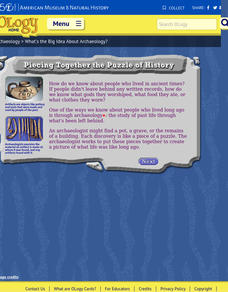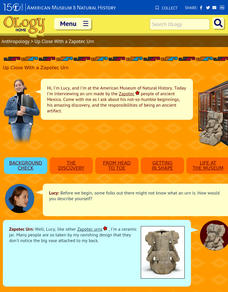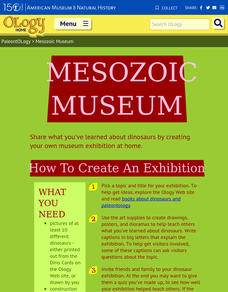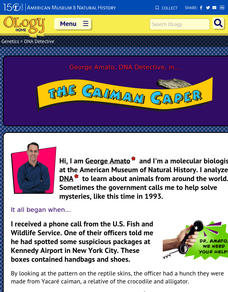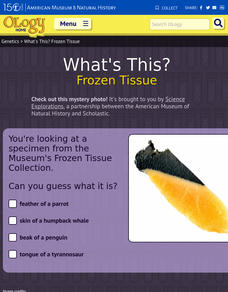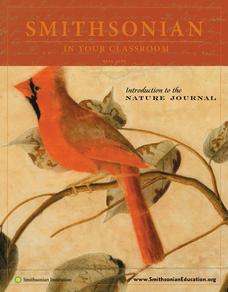Curated OER
National Museum of Natural History
Students explore U.S. history by participating in a class field trip. In this museum instructional activity, students attend a field trip to the Natural History Museum and identify cultural stories and art pieces they enjoy. Students...
American Museum of Natural History
What's the Big Idea About Archeology
The American Museum of Natural History offers a website sure to engage young anthropologists. Learners can dig into a site that offers an explanation of the field of archaeology, the kinds of questions archaeologists ask that launch...
Curated OER
The Stuff of Stories: Using Museums to Inspire Student Writing
Middle schoolers write descriptions, narratives, and dialogues based on objects of art and time periods in a museum. They base several writing assignments on art objects and paintings, including a literal description and an emotional...
American Museum of Natural History
Up Close With a Zapotec Urn
If a Zapotec urn, buried for over a thousand years in a temple in the lost city of Xoxocotlan in the Valley of Oaxaca in the mountains of southern Mexico could talk image the stories it could tell. That's the set up in a clever resource...
American Museum of Natural History
Mesozoic Museum
Mini museum curators create an exhibit that showcases the Mesozoic era. Pupils use their knowledge of dinosaurs to make informative posters, drawings, and dioramas. Following three steps to complete the hands-on activity, scholars read...
Curated OER
Archaeology 101
Let's go on an archaeological dig! Here is a lesson plan that allows your young scientists to do just that! You fill up an empty water table or tray with sand, and bury miscellaneous objects. Pupils use spoons, sifters, and brushes to...
Curated OER
The Effect of Natural Selection on Genes, Traits and Individuals
Rotating through five stations, evolutionary biologists explore the question of how changes in DNA facilitate the changes in a population over time. High-quality, colorful cards of animals, skeletons, skulls, and DNA sequences can all be...
Curated OER
Social Studies Wonders: An Exploration
Help middle schoolers conduct Internet research and develop a working definition for the discipline of social studies. From a list of websites, they develop classification skills and differentiate between primary and secondary sources....
American Museum of Natural History
DNA Detective
Match up the DNA code. Pupils read the website from the American Museum of Natural History about how DNA can determine whether a skin is from a particular type of reptile. Using the same technique, learners match up products with the...
American Museum of Natural History
What's This? Frozen Tissue
Take a peek into thousands of frozen samples. Learners try to identify an image of a piece of frozen tissue. After choosing the correct answer, scholars find out more information about the American Museum of Natural History's Frozen...
American Museum of Natural History
Making a Field Journal
Trowels and brushes are certainly important tools for an archaeologist working on a dig. Perhaps more important, however, is the archaeologist's field journal. Christina Elson, an archaeologist working with the American Museum of Natural...
National Park Service
The Young Naturalist
Beginning with a brief history of our 26th president, Theodore Roosevelt, then followed by a discussion of his interest in nature, young scientists take to the outdoors to locate and observe local plants and insects. Scholars return to...
Curated OER
Artificial Selection
The second lesson in the series begins with a starter activity discussing wild versus domesticated animals. Then, scholars play a card game, with optional variations, to emphasize artificial selection. Next, they attend a field trip to a...
American Museum of Natural History
A Whale of a Tale
What's the most interesting fact about a blue whale? Learners read an interview about the similarities between the Titanosaur and the blue whale displays at the American Museum of Natural History. Pupils learn not only about blue whales...
American Museum of Natural History
All About Cloning
Start seeing double. The American Museum of Natural History website provides pupils with information about Dolly, the cloned sheep. Learners find out the procedure used to create Dolly along with why scientists clone animals.
American Museum of Natural History
Ask a Scientist About Our Environment
Let's ask an expert! Scientists at the American Museum of Natural History field questions about the environment in an interactive resource. Question topics range from global warming and conservation to endangered species and habitats.
Curated OER
Landscape Confection: Pre-visit Activity
Upper graders explore the concepts of landscape art, man, nature and their inter-relationship. This is a critical thinking and analysis activity intended to prepare the class for an up coming trip to a local art museum. They analyze,...
American Museum of Natural History
Field Trip Mars
Fly around the Martian surface. Pupils view a presentation on the planet Mars featuring a flyover that shows different views of the surface where rovers have landed and explored on different missions. As individuals watch the images, the...
Curated OER
The Museum Idea
Students evaluate and record the various types of museum careers. In this The Museum Idea instructional activity, students create a bicentennial time capsule, design a Museum of me, and make a classroom mini museum. In addition students...
New York City Department of Education
Egypt
This six-week unit encompasses all subjects with a focus study on world history and the development of ancient civilizations. As gifted and talented students dive into the interesting yet challenging topic of Egypt, they think critically...
Curated OER
Nature in a Flick of the Eye
Students explore the visual information a diorama artist provides by thinking of all the details for the background of a location described by their teacher. They investigate diorama artists and their importance in creating the illusion...
Curated OER
From Curiosity Cabinet to Museum Collection
Learners study binomial nomenclature and museum-based research. They create a curiosity box, label the objects in their curiosity box , develop a classification scheme for the objects, and create a database of all objects collected by...
Curated OER
Biomimicry, Nature: Architecture of the Future
Students explore the relationship between nature and architecture. In this cross curriculum history, culture, and architecture lesson, students observe and discuss structures visible in nature. Students view websites in which Native...
Curated OER
Introduction to the Nature Journal
Young scholars create nature journals. In this introduction to the nature journal lesson, students discover the uses of nature journals and begin their own. Young scholars are challenged to use vivid, concise terms in their descriptive...



